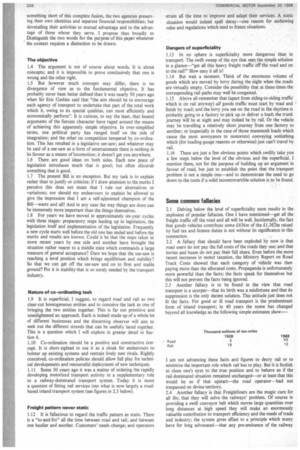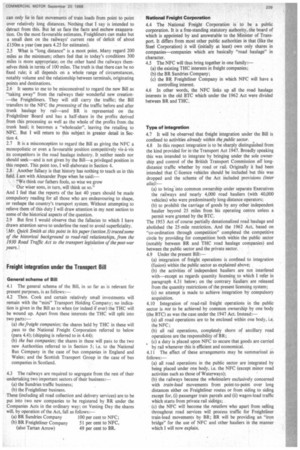Thousand-millions of ton-miles 1928 1968 5 43 \ Road Rail 18 13
Page 212

Page 213

If you've noticed an error in this article please click here to report it so we can fix it.
I am not advancing these facts and figures to decry rail or to minimize the important role which rail has to play. But it is foolish to close one's eyes to the true position and to behave as if the rail-dominated situation remained unchanged—or at least that this would be so if that upstart—the road operator—had not trespassed on divine territory.
2.4 Another fallacy is that Freightliners are the magic cure for all ills; that they will solve the railways' problem. Of course in providing a swift conveyor belt which moves large quantities over long distances at high speed they will make an enormously valuable contribution to transport efficiency and the needs of trade and industry; the system gives effect to a principle which many have for long advocated—that any pre-eminence of the railway can only lie in fast movements of train loads from point to point over relatively long distances. Nothing that I say is intended to detract from this. But let us face the facts and eschew exaggeration. On the most favourable estimates, Freighliners can make but a small dent on the railways' current rate of deficit of about .£150m a year (see para 4.25 for estimates).
2.5 What is "long distance" is a moot point. Many regard 200 miles as the minimum; others feel that in today's conditions 300 miles is more appropriate; on the other hand the railways themselves think in terms of 100 miles. The truth is that there can be no fixed rule; it all depends on a whole range of circumstances, notably volume and the relationship between terminals, originating points and destinations.
2.6 It seems to me to be misconceived to regard the new Bill as "taking away" from the railways their wonderful new creation-the Freightliners. They will still carry the traffic; the Bill transfers to the NFC the processing of the traffic before and after trunk haulage by rail—and BR is represented on the Freightliner 'Board and has a half-share in the profits derived from this processing as well as the whole of the profits from the trunk haul; it becomes a "wholesaler", leaving the retailing to NFC. But I will return to this subject in greater detail in Section 4.
2.7 It is a misconception to regard the Bill as giving the NFC a monopolistic or even a favourable position competitively vis-ii-vis its competitors in the road haulage industry. It neither needs nor should seek—and is not given by the Bill—a.privileged position in this respect. This point too, I will elaborate in Section 4.
2.8 Another fallacy is that history has nothing to teach us in this field. i am with Alexander Pope when he said:—
"We think our fathers fools, so wise we grow Our wiser sons, in turn, will think us so."
And I feel that the reports of the last 40 years should be made compulsory reading for all those who are endeavouring to shape, or reshape the country's transport system. Without attempting to relieve them of this duty I will draw attention in my next section to some of the historical aspects of the question.
2.9 But first I would observe that the fallacies to which I have drawn attention serve to underline the need to avoid superficiality. [Mr. Quick Smith at this point in his paper (section 3) traced some of the historical background to road-rail relationships, from the 1930 Road Traffic Act to the transport legislation of the post-war years.


















































































































































































































































































































































































